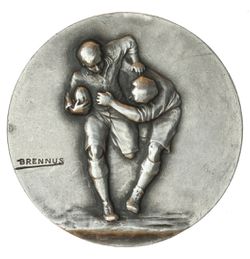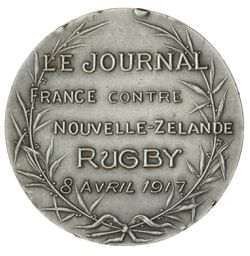Sporting & General Medals, Badges & Awards - Rugby &
Lot 3229 SESSION 12 (4.30PM WEDNESDAY 13TH SEPTEMBER) Sporting & General Medals, Badges & Awards - Rugby & Ru
Estimate $1,500
Bid at live.noble.com.au
FRANCE VS NEW ZEALAND, 8 April 1917, struck in silver (32mm), by Brennus (Paris). Minor edge nicks, otherwise extremely fine and excessively rare.
The following courtesy of National Library of New Zealand, Papers Past, from the "New Zealand Times" 5 June 1917:-
"It had been the great ambition of the New Zealand team to make a trip to England to play the famous, and up till then unbeaten Army Service team, and also to play a match against Wales, but the exigencies of war barred the way.
As some solace for this disappointment, however, a match was played in Paris between a team representing New Zealand, and one representing France. This match, arranged by the proprietors of the well-known French newspaper "Le Journal" and L'Union des Societies Francaise de Sports Athletiques, assumed the importance of an international event, and drew an enormous concourse of 60,000 people to the ground at Vincennes, just outside the gates of Paris. This attendance is supposed to be a world's record for a Rugby football match. Members of the French Ministry, British and French generals, and representatives of such far-apart countries as America, Russia, Roumania, and Montenegro were present.
The teams were New Zealand- Full-back: Bombardier H.W.Adams; three-quarters, Sergeant E.Ryan, Sergeant G.Murray (captain), Corporal G.Owles; five-eighths, Private N.F.Stead, Bombardier G.C.Mclntyre; half, Sapper G.Brown; wing, Lance Corporal R.Taylor; forwards, Privates R.Fogarty, G.Whittington, A.Wilson, Gunner L.Cockroft, Private G.King, Lance-Corporal J.Moffatt, Private T.French.
France - Full-back, Second-Lieutenant Bechade; three-quarters, Corporal Juppe, Aide-Major Jaureguy, Adjutant Pilote Aviateur Strohl, Lieutenant le Fozieres; halves, Mar.Logis Pilote Aviateur Boyau (capitane), Second-Lieutenant Bascou; forwards, S.Lieutenant Fellonneau, Sergeant Jules Forgues, Second-Lieutenant de Beyssac, Mar.Logis Arnal. Motoc. Manniot, Capitane Eluere, Aide-Major Favre. Mar. Logis Rouzies.
Twenty-three French generals were written to, and gave their consent to officers and men leaving the front to take part in the match. Several of the French players had taken part in an attack against the Germans on the preceding day. Captain Eluere had been in a "tank" in an engagement at 5.30pm on the preceding day. Boyau, the captain of the team, had brought down no fewer than seventeen German aeroplanes. The other aviators had each two or three enemy planes to their credit. Every man in the team had come straight from the front.
As the teams filed on to the ground the enthusiasm of the crowd knew no bounds. The band played the Marsellaise and the grave notes of "God Save the King," and the flags of the Allies fluttered bravely in the breeze. I was unable myself to go to Paris to see the match, but I gather from those who were present that the play was quite interesting, and that the score is scarcely an indication of the excellent fight put up by the French team.
The New Zealanders were, as usual, slow in getting to work, and in the first spell they put on only eleven points, in the second spell they showed a decided superiority in passing and in the finer points of the game.
Experts say that since the All Blacks visited Paris some ten years ago there has been a great improvement, in French Rugby play, and that the New Zealand team in this match showed that they were better than any that had visited Paris except the All Blacks, and, possibly the South Africans.
Of late years the French have been in the habit of playing four International matches each year, against England, Scotland, Ireland, and Wales, and generally they manage to win one of these matches, so it may he conceded that their standard of play is a pretty high one.
ENTHUSIASTIC RECEPTION.
The reception of the team at the match and generally in the few days they were in Paris was extraordinarily enthusiastic. They were there at a memorable time. The news of the declaration of war against Germany by the United States of America had come to hand, and in honour of the event the tricolour was fluttering in every street in Paris and in the streets of every town and village behind the battle zone in France. And in addition the British, in the great battle of Arras, had just proved, for the second time, that they were capable of smashing the flower of the German Army in Northern France.
Enthusiasm in the cause of the Allies had reached a high pitch. When, finally, the New Zealand team had lined up and gave a performance of the wild Maori war dance, the "haka" roars of laughter and cheering resounded from all parts of the ground.
Afterwards the French journals described how the strange rhythm of the dance was taken up from the captain by the rest of the team with expressive motions and the beating of hands and feet and loud and sharp cries, "As the men take up the chorus," one writer said, "the public acclaim our guests, who, without losing time, begin to give forth their terrible "Komati-Komati-Kaourah." A few moments later the French team entered the field and received in its turn as warm a greeting as its rivals. "Bravo les poilus," frantically shouted the spectators, for they were in truth poilus, and real ones, those footballers in red stockings, for several of them, for instance the young Captain Eluero, on the very eve of the match had taken part in an attack against the Germans.
At the conclusion of the game the French team rushed to the New Zealanders and in a trice they had stripped off their jerseys and exchanged them for their own.
The journey from the gates back to Paris was in the nature of a triumphal procession. The crowds again gave vent to their enthusiasm, and women rushed forward and kissed the New Zealand heroes. In Paris the members of the team were feted right loyally. They were banqueted by "Le Journal," invited to the clubs, and had seats reserved for them at the theatres. The "Journal" proprietors presented them with a spirited statuette in bronze, "Le Lancenr de Grenades" by the sculptor Chauvel, a Salon exhibitor, designed whilst he himself was in the trenches. This "Coupe de la Somme," as it has been named, is indeed an interesting trophy to take back across the seas to New Zealand. It is perhaps the most unique memento of our participation, in the war. In addition each one of the "athletes and heroes" received a beautiful medallion in frosted silver, on which is the famous figure in relief of La Marsellaise from the Arc de Triomphe. They also were given tinder boxes of solid gold or gold and silver. Those also were from "Le Journal." Other journals, including the "Daily Mail" and "Sporting," likewise entertained the New Zealanders. They had the time of their lives, and New Zealand got an advertisement second only to the part it has taken in the war in this generous country."
Note: The date of play and the score were not mentioned in the above article but it is believed to be the match played on 8 April 1917, the score being 40:0 to New Zealand.
Estimate / sale price does not include buyer's premium (currently 22% including GST) which is added to hammer price. All bids are executed on the understanding that the Terms & Conditions of sale have been read and accepted. For information on grading and estimates please refer to the Buying at Auction advice.
Quick find
View a lot by number and sale.
Adjacent lots
Lot 3227
LEVIN WANDERERS, handcrafted in gold (9ct, 7.4g, 35x34mm), no maker, ring top suspension, reverse inscribed ...
Estimate $250
Lot 3228
RUGBY AND BOXING MEDALS, fob medals awarded to L. (Len) Williams: hand engraved in gold ...
Estimate $1,200
Lot 3229 This lot
FRANCE VS NEW ZEALAND, 8 April 1917, struck in silver (32mm), by Brennus (Paris). Minor ...
Estimate $1,500
Lot 3230
RUGBY, prize fob medal, 1917, hand engraved in gold (9ct, 7.6g, 29x28mm), by W.A.Brown (Invercargill), ...
Estimate $250
Lot 3231
A.F.C. (Athletic Football Club), (North Otago), hand engraved in gold (9ct, 5.0g, 28mm), by J.Reid ...
Estimate $200

